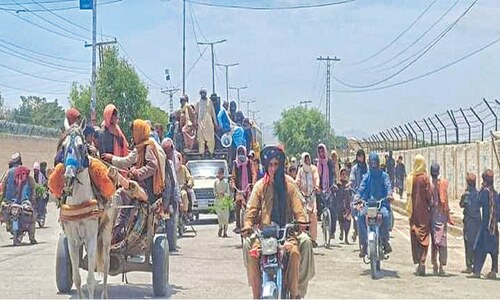IN an election campaign barren of debate on any major issue of policy, domestic or foreign, India's political parties have taken recourse to tasteless invective, recalled ghosts of the past and flogged dead horses.
In this futile and joyless exercise one issue has cropped up which bids fair to survive the results of the Lok Sabha elections due today.
It is the crores allegedly stashed away in Swiss banks. It is the subject of a public interest litigation in the Supreme Court. The petitioners seek the court's order to the government for the repatriation of the money and prosecution of the tax evaders.
Comment on this litigation is withheld, of course. But comment, severely critical, is in order on the irresponsible politicians of the BJP who have gone about this business with crass ignorance of Swiss law and Switzerland's banking system. The BJP published the 'Interim recommendations of the Task Force on the steps to be taken by the Indian Government to bring back Indian funds illegally stashed away in secret Swiss bank accounts and other tax havens around the world'. The document was innocent of any taint of competence. The Swiss law was ignored altogether.
That is no reason for neglecting the subject which concerns the entire Third World. Involved are two points of inquiry. If a state is really honest about getting the money, it must first investigate on its own territory the misdoings of the citizen it suspects. The investigation must be thorough. Only if it unravels the transaction he undertook from within the country can it properly ask the foreign state's assistance in the recovery of its citizens' ill-gotten gains.
The Swiss have received little justice. They have fully cooperated whenever a country, armed with authentic evidence, sought its support. In the case of the former president of the Philippines, Ferdinand Marcos, the Swiss government went so far as to exercise its powers, under Article 102 of the 1874 constitution, much to the annoyance of the banks, in order to get at the money he had deposited in the banks. The new constitution of 1989 recasts Article 102 in Articles 184-187. Assets of President Duvalier of Haiti were frozen. The Swiss Federal Banking Commission (SFBC) exposed the assets of the former president of Nigeria Sani Abacha on its website for the whole world to know. Deposits of the former head of Peru's secret service and adviser to the President Vladimiro Torres were returned to Peru.
The law is clear and effective. It is the federal act on International Mutual Assistance in Criminal Matters (IMAC) enacted on March 20, 1981. The Federal Office for Police Matters is a division of the Federal Department of Justice and Police at Berne. Under the IMAC, the federal office receives requests for assistance “directly from the Ministry of Justice of the requesting state” (Article 29 (2)). They need not be routed through the usual diplomatic channels. Article 17 says that “the Federal Department of Justice and police shall decide cases under Article 1a.” Article 1a reads thus “In the application of this Act, the sovereignty, security, public order or similar essential interests of Switzerland shall be taken into account.”
The law is wide in its reach. Article 11 says “A person pursued within the meaning of this Act is any person suspected, under investigation or affected by a sanction. A sanction is any punishment or (other penal) sanction.” The requesting state can as legitimately seek the bank accounts of suspects abroad as it can those of suspects at home.
Four forms of cooperation are provided by the IMAC — extradition of the offender, “transfer of proceedings and punishment of offences”; execution of foreign criminal judgments; and, what concerns all requesting states, “assistance aimed at supporting criminal proceedings abroad”. Article 63 defines Swiss assistance widely enough to cover acts that “appear to be necessary for proceedings carried out abroad in criminal matters or serve to retrieve the proceeds of the offence”. That includes search of persons and rooms and seizure of things, obtaining of evidence as well as handing over the assets “with a view to forfeiture or restriction to the entitled person”.
As a rule, the evidence so obtained can only be used in the case for which it is sought. After the conclusion of the mutual assistance procedure, the documents or assets seized as evidence “shall be put at the disposal of the competent foreign authority”.
The federal supreme court ruled on Dec 10, 1997, in the Marcos case, that Swiss interests do not lie in the rejection of the foreign request necessarily. On the contrary, it is not in the interest of Switzerland to become a safe haven for flight capital or “criminal moneys”. This damages its reputation and with it, the country's interests as well. The court ruled emphatically that this must be taken into account when a decision is being made on the foreign requests for assistance.
IMAC covers tax fraud as well as tax evasion. Incomplete, even false, tax returns constitute “evasion” punishable by tax authorities with fine. Falsification of records is the criminal offence of tax fraud. So is “willful deceit” to evade tax even without tampering with records. What more can any state in genuine quest of ill-gotten gains by its citizen expect of the foreign state where he has hidden them?The truth is that there is little investigation at home. Swiss laws are cited as an excuse. That will not do. As James Nason, head of the International Communications of the Swiss Bankers' Association at Basel pointedly remarked — there can be no “fishing” inquiry. The message is clear — do your homework first and then ask us for our assistance.
The writer is an author and a lawyer.










































Dear visitor, the comments section is undergoing an overhaul and will return soon.